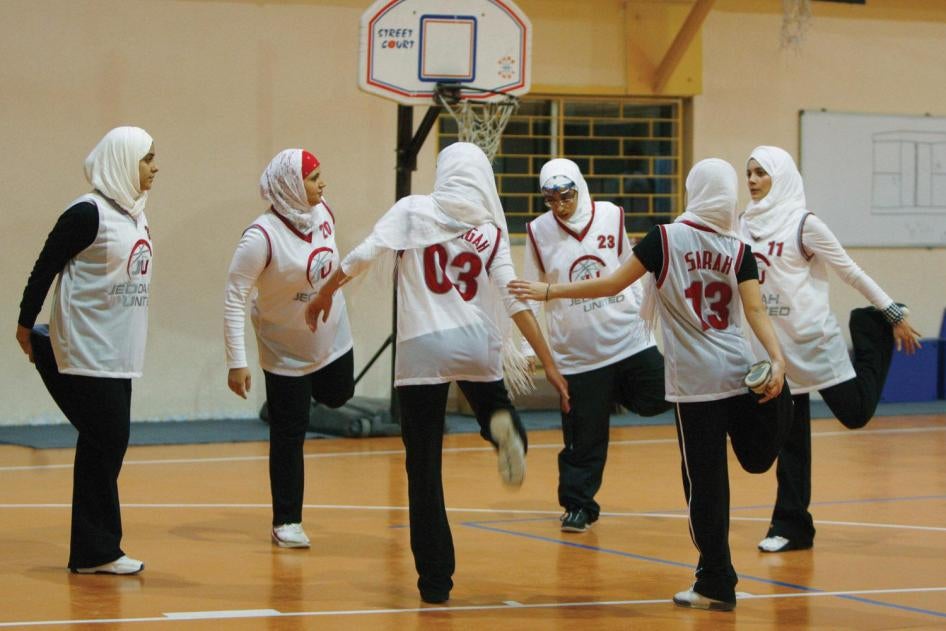(Beirut) – Saudi Arabia’s reversal of its longstanding ban on sports for women and girls in public schools is a vital step forward, Human Rights Watch said today. But serious hurdles, including the country’s male guardianship system, remain in place, preventing women from fully accessing the education and health benefits of sports exercise.
The announcement, published on the Education Ministry’s website on July 11, 2017, states that Saudi girls’ schools will offer a physical education program beginning in the fall 2017 school term “in accordance with Islamic law standards” and would scale up “according to the possibilities available in each school” including sports halls and competent women instructors. The statement said that the ministry made the decision to fulfill the goals of Vision 2030, an ambitious government roadmap for economic and developmental growth.
“This overdue reform is absolutely crucial for Saudi girls, who have been denied their basic human right to health through exercise, joining teams, and the long-term health, economic, and education benefits of sports,” said Minky Worden, director of global initiatives at Human Rights Watch. “This important step forward can advance human rights and health for women despite the daunting legal hurdles that remain in the country.”
One Saudi women’s rights activist told Human Rights Watch that she welcomed the announcement that Saudi Arabia will offer physical education in government schools, but warned that it did not offer details of how it will be carried out. She said that no girls’ public school in Saudi Arabia currently has sports infrastructure and there are few female sports instructors. In addition, the statement did not say whether physical education will be mandatory for girls, or if schools will require girls to get parental permission to enroll in P.E. classes.
Saudi Arabia lacks government sports infrastructure for women, with all stadiums, sport clubs, courses, expert trainers, and referees limited exclusively to men. Official sporting bodies hold no sports competitions for Saudi women athletes in the country, and do not provide support and training to Saudi sportswomen hoping to compete in regional and international competitions. But, in a positive move, on August 1, 2016, the General Authority for Sports, which functions like a sports ministry, announced a new female department and appointed Princess Reema Bint Bandar Al Saud as its head.
Saudi Arabia should build upon this recent reform and open sections in the more than 150 Saudi Sports Federations to women, and remove the ban on women spectators in stadiums, Human Rights Watch said.
For the past decade, Human Rights Watch has advocated strongly for access to sports for women and girls in Saudi Arabia. In its 2012 report, “Steps of the Devil,” Human Rights Watch found that Saudi government restrictions put athletics beyond the reach of almost all women and girls. In its 2016 research, Human Rights Watch found that women were increasingly claiming their right to play sports, but that the country’s national policies and male guardianship system created sometimes insurmountable hurdles to meaningful participation in exercise.
As documented in the Human Rights Watch 2016 report, “Boxed In,” Saudi Arabia’s male guardianship system remains the most significant impediment to women’s rights in the country.
Every woman must have a male guardian – a father, brother, husband, or even a son – who has the authority to make a range of critical decisions on her behalf, including whether she can apply for a passport, travel outside the country, study abroad on a government scholarship, get married, or be released from prison. On April 17, King Salman issued an order to all government agencies to provide women access to government services without a male guardian’s consent unless existing regulations require it, and to provide a list within three months of procedures that require male guardian approval. The deadline for agencies to provide the list is in two days.
Women regularly face difficulty conducting a range of transactions without a male relative’s consent or presence – from renting an apartment to filing legal claims. They are barred from driving in Saudi Arabia, which is a barrier to taking part in team training or sports.
The order appears to keep in place regulations that explicitly require guardian approval, such as for women to travel abroad, obtain a passport, or get married. It also does not address areas in which private individuals and entities ask women for guardian permission such as before they are employed or undergo medical procedures.
“Sports for girls in Saudi state schools is a significant advance that gets the reform ball rolling,” Worden said. “But women and girls will not be able to see the full health, economic, and education benefits of sport until the male guardianship system is gone.”









